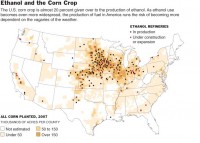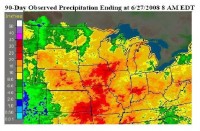By Jad Mouuawa, New York Times
The record storms and floods that swept through the Midwest last month struck at the heart of America’s corn region, drowning fields and dashing hopes of a bumper crop. They also brought into sharp relief a new economic hazard. As America grows more reliant on corn for its fuel supply, it is becoming vulnerable to the many hazards that can damage crops, ranging from droughts to plagues to storms.
The floods have helped send the price of ethanol up 19 percent in a month. They appear to have had little effect on the price of gasoline at the pump, as ethanol represents only about 6 percent of the nation’s transport fuel today. But that share is expected to rise to at least 20 percent in coming decades. Experts fear that a future crop failure could take so much fuel out of the market that it would send prices soaring at the pump. Eventually, the cost of filling Americans’ gas tanks could be influenced as much by hail in Iowa as by the bombing of an oil pipeline in Nigeria.
“We are holding ourselves hostage to the weather,” said John M. Reilly, a senior lecturer at the Massachusetts Institute of Technology and an ethanol expert. “Agricultural markets are subject to wide variability and big price spikes, just like oil markets.”
But concerns that the floods could tighten corn supplies this year have pushed up both corn and ethanol prices. Ethanol, which was already rising before the floods, has nearly doubled from its low of $1.50 a gallon in September. “Our energy policy is like playing Russian roulette with every chamber loaded,” said Lawrence J. Goldstein, an energy analyst at the Energy Policy Research Foundation, a group backed by the oil industry. “We’ve doubled up on the weather risk.” Read more here.

See the Corn and Ethanol Production here

This is the precipitation April to June. See larger map here.
By John Brignell
He made a prediction and it did not happen (also shown here). Fair enough, that is how science progresses, but any relationship between the Hansen phenomenon and science is rather remote. His latest calling down of fire and brimstone is upon the wicked oil executives, who are allegedly stoking up infidel opposition to the true gospel of the global warming catastrophe to come. That this is not true is evident from the greener-than-thou advertisements put out by that industry. They know a good racket when they see one and if there are a few billion taxpayers’ dollars on offer they want their share of them. They are, however, likened to the tobacco giants who so misled the public.
Yes those were liars; but so were their opponents, led by the EPA, and they turned out to be better at it. The current big lie is that all the sceptical commentators are in the pay of the nefarious industry. Hansen’s answer to it all is to call for an inquisition (he is a bit late into that game, by about five years). “May you have what you wish for” is an ancient curse and it would be satisfying to see Hansen have his day in court.
The reason that Monty Python’s dead parrot so rapidly became a dead metaphor is that it encapsulates the modern political phenomenon of lying with a straight face, when all parties involved know that it is a lie (It’s not a constitution, it is just a treaty). So now, when we are told that Global Warming isn’t dead, it’s just restin’, we accept it as just a normal part of the political process. Formerly it would have been regarded as an example of the fifth of Langmuir’s laws of bad science.
It is quite extraordinary that this sort of activity should fester within the world’s most notable scientific and engineering organisation. Anyone who has had the misfortune to have been reluctantly involved with such a weirdo will feel the embarrassment for all those genuine professionals whose ingenuity, among many other achievements, put a man on the moon. They obviously tried to subject him to some sort of control, quite properly in a tax-funded, non-academic institution, which led to his wild claim to being censored. He must be the least censored person on the planet, thanks to his friends in high places. Perhaps the world will one day be grateful to the brave band of volunteers, who have at last got together to provide an audit of the activities of such fanatics. Owing to the efforts of the likes of Steve McIntyre and Anthony Watts, we have been able to penetrate the unscientific veil of secrecy behind which they brew their spells and hokum. Not only are the standards of software production and maintenance way, way below the standards officially embraced by NASA, some of the procedures are unbelievably bizarre, including even the Orwellian process of systematically rewriting the past.
A phenomenon indeed! Read more by John Brignell here.
By Paul Driessen, CORE
“We can’t drill our way out of our energy problem.” This daily mantra underscores an abysmal grasp of economics by the politicians, activists, bureaucrats and judges who are dictating US policies. If only their hot air could be converted into usable energy. Drilling is no silver bullet. But it is vital. It won’t generate overnight production. But just announcing that America is finally hunting oil again would send a powerful signal to energy markets … and to speculators - many of whom are betting that continued US drilling restrictions will further exacerbate the global demand-supply imbalance, and send “futures” prices even higher. Pro-drilling policies would likely bring lower prices, as did recent announcements that Brazil had found new offshore oil fields and Iraq would sign contracts to increase oil production. Conversely, news that supplies are tightening - because of sabotage in Nigeria’s delta region, or more congressional bans on leasing - will send prices upward.
One of our best prospects is Alaska’s Arctic National Wildlife Refuge, which geologists say contains billions of barrels of recoverable oil. If President Clinton hadn’t bowed to Wilderness Society demands and vetoed 1995 legislation, we’d be producing a million barrels a day from ANWR right now. That’s equal to US imports from Saudi Arabia, at $50 billion annually. Drilling in ANWR would get new oil flowing in 5-10 years, depending on how many lawsuits environmentalists file. That’s far faster than benefits would flow from supposed alternatives: devoting millions more acres of cropland to corn or cellulosic ethanol, converting our vehicle fleet to hybrid and flex-fuel cars, trying to build dozens of new nuclear power plants, and blanketing thousands of square miles with wind turbines and solar panels. These alternatives would take decades to implement, and all face political, legal, technological, economic and environmental hurdles.
ANWR is the size of South Carolina. Its narrow coastal plain is frozen and windswept most of the year. Wildlife flourish amid drilling and production in other Arctic regions, and would do so near ANWR facilities. Inuits who live there know this, and support drilling by an 8:1 margin. Gwichin Indians who oppose drilling live hundreds of miles away - and have leased and drilled nearly all their own tribal lands, including Caribou migratory routes.
Drilling and production operations would impact only 2,000 acres - to produce 15 billion gallons of oil annually. Saying this tiny footprint would spoil the refuge is like saying a major airport along South Carolina’s northern border would destroy the entire state’s scenery and wildlife.
It’s a far better bargain than producing 7 billion gallons of ethanol in 2007 from corn grown on and area the size of Indiana (23 million acres). It’s far better than using wind to generate enough electricity to power New York City, which would require blanketing Connecticut (3 million acres) with turbines. Anti-drilling factions also assert: “US energy prices are high, because Americans consume 25% of the world’s oil, while possessing only 3% of its proven oil reserves.” Possession has nothing to do with prices - any more than owning a library, but never opening the books, improves intellectual abilities; or owning farmland that’s never tilled feeds hungry people.
This energy belongs to all Americans. It’s not the private property of environmental pressure groups, or of politicians who cater to them in exchange for re-election support. This energy is likewise the common heritage of mankind. Politicians and eco-activists have no right to keep it off limits - and tell the rest of the world: We have no intention of developing American energy. We don’t care if you need oil, soaring food and energy prices are pummeling your poor, or drilling in your countries harms your habitats to produce oil for US consumers. Those attitudes are immoral and intolerable. It shows disdain for the world’s poor. And it.s bad for the global environment. It’s time to drill again here in America - onshore and off, in Alaska and the Lower 48 - while conserving more and pursuing new energy technologies for the future. Read more here.


